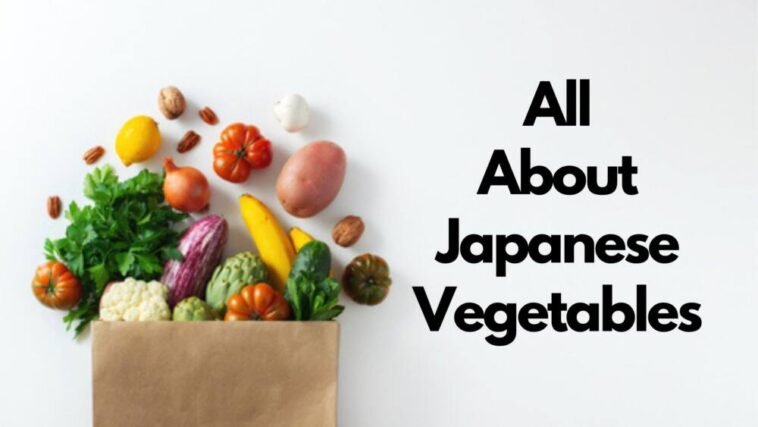Here’s a list of Japanese vegetables for you to try! Check it out! I’ve included pictures of Japanese vegetables so you can easily recognise these Japanese vegetables next time you go to Japanese supermarket!
The Japanese place a very important role in vegetables as a part of their cuisine. We all know the importance of including vegetables as a part of a balanced diet. Vegetables are packed with nutrients, vitamins, minerals, and other essentials that are required for our well-being.
For us, there are different ways of including vegetables in our dishes. We love pickled vegetables as well as vegetables that are cooked in broth.
There are only a few vegetables that are native to Japan. Other vegetables that are a very important part of Japanese cuisine today came to Japan from different sources.

Here is a guide to all the popular Japanese vegetables that you can try in different ways. This is not the complete list, so do not be surprised when you come across some other interesting and delicious vegetables.
Page Contents
List of Japanese Vegetables
Cabbage
We have all heard of and ate this versatile vegetable called cabbage. It is quite an inexpensive vegetable but it is packed with nutrition and flavor. This is one vegetable that you can use in several dishes. In Japan, cabbage is often sliced into thin strips and it is served in a variety of fry dishes.
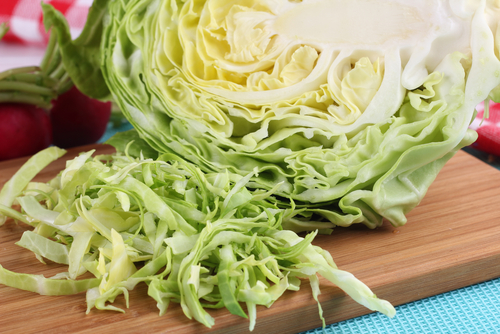
The beauty of this vegetable is that it can be added to just about any dish from soups and stews to pan-fried meals and salads. When we talk about cabbage production in Japan, it is one of the top producers of this vegetable. Also, cabbage is one of the most bought vegetables by the Japanese.
Health Benefits Of Japanese Cabbage
- Improved digestion: Japanese cabbage is a good source of fiber, which can help to keep your digestive system healthy and regular. The fiber in Japanese cabbage also helps to bind to toxins and waste products in the gut, which can help to promote detoxification.
- Reduced inflammation: Japanese cabbage contains antioxidants and other plant compounds that can help to reduce inflammation throughout the body. This can be beneficial for people with conditions such as arthritis, heart disease, and cancer.
- Protection against cancer: Japanese cabbage contains glucosinolates, which are sulfur-containing compounds that have been shown to have anti-cancer properties. Studies have shown that glucosinolates may help to prevent the growth and spread of cancer cells.
- Heart health: Japanese cabbage is a good source of potassium, which is an important mineral for heart health. Potassium helps to regulate blood pressure and heart rate, and it can also help to protect against heart disease.
- Weight loss: Japanese cabbage is a low-calorie, high-fiber vegetable that can help you to feel full and satisfied after eating. This can make it a helpful food for people who are trying to lose weight or maintain a healthy weight.
In addition to these health benefits, Japanese cabbage is also a good source of vitamins C, K, and B6, as well as folate, manganese, and calcium. It is a versatile vegetable that can be eaten raw, cooked, or fermented.
Related: List of Japanese Mushrooms
Hakusai
Hakusai is also known as Chinese cabbage. It is one of the most popular types of cabbages in many parts of Asia. This type of cabbage is often pickled. In Korea, this is the type of cabbage that is used to make kimchi, which is a dish that is popular all over the world.
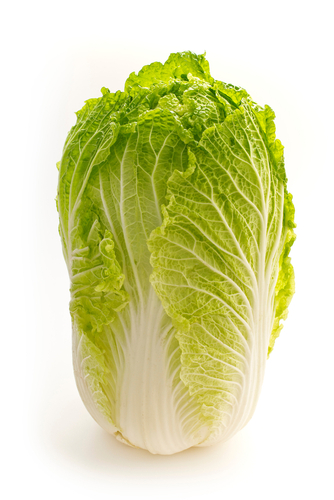
In Japan, the Chinese cabbage is also pickled and the dish that is thus made is known as Hakusai no sokuseki zuke. This is a very mild and fresh Chinese cabbage that is also used for hot pot dishes.
Health Benefits of Hakusai
- Boosts immunity: Hakusai is a good source of vitamin C, an antioxidant that helps boost the immune system. Vitamin C also helps the body absorb iron, which is essential for red blood cell production.
- Protects against cancer: Hakusai contains sulforaphane, an antioxidant that has been shown to protect against cancer. Sulforaphane helps to detoxify the body and prevent the formation of cancer cells.
- Lowers blood pressure: Hakusai is a good source of potassium, a mineral that helps lower blood pressure. Potassium helps to balance the effects of sodium in the body, which can lead to high blood pressure.
- Improves heart health: Hakusai is a good source of fiber, which can help lower cholesterol levels and improve heart health. Fiber also helps to regulate blood sugar levels, which can reduce the risk of heart disease.
- Aids in weight loss: Hakusai is a low-calorie vegetable that is high in fiber. This makes it a good choice for people who are trying to lose weight or maintain a healthy weight.
In addition to these health benefits, Hakusai is also a good source of vitamins A, K, and folate. It is a versatile vegetable that can be eaten raw, cooked, or pickled. Hakusai is a delicious and nutritious addition to any diet.
- Related: Are Japanese Peanuts Good for you?
- Related: Are Japanese Spider Crabs Edible
- Related: Are Japanese Plums Edible
Horenso
Yet another popular leafy vegetable in Japan is Horenso or spinach. This is one of the most nutrient-rich and healthy vegetables that you can get. Apart from all the health benefits that spinach has, it also contains tons of Vitamins, Calcium, and Iron.
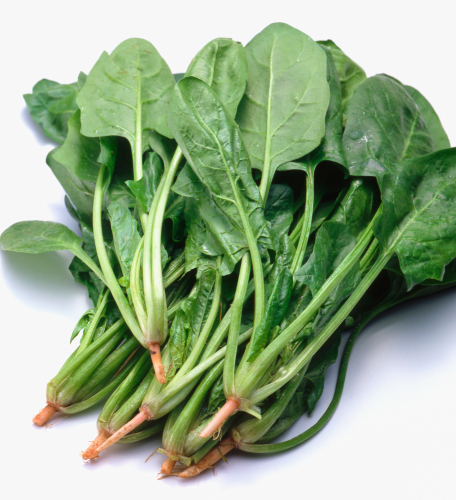
One of the most well-known dishes made using foreign so in Japan is horenso no goma-ae or spinach with sesame dressing. It is quite easy to make this dish at home. In fact, I make it quite often and believe me, everybody in my family loves it.
All you have to do is Blanche the spinach and then mix it with a sweet soya sauce and use sesame flavored dressing. You can also use Horenso as toppings for soups.
Health benefits of Horenso:
- Boosts immunity: Horenso is a good source of vitamin C, an antioxidant that helps boost the immune system. Vitamin C also helps the body absorb iron, which is essential for red blood cell production.
- Protects against cancer: Horenso contains sulforaphane, an antioxidant that has been shown to protect against cancer. Sulforaphane helps to detoxify the body and prevent the formation of cancer cells.
- Lowers blood pressure: Horenso is a good source of potassium, a mineral that helps lower blood pressure. Potassium helps to balance the effects of sodium in the body, which can lead to high blood pressure.
- Improves heart health: Horenso is a good source of fiber, which can help lower cholesterol levels and improve heart health. Fiber also helps to regulate blood sugar levels, which can reduce the risk of heart disease.
- Aids in weight loss: Horenso is a low-calorie vegetable that is high in fiber. This makes it a good choice for people who are trying to lose weight or maintain a healthy weight.
In addition to these health benefits, Horenso is also a good source of vitamins A, K, and folate. It is a versatile vegetable that can be eaten raw, cooked, or pickled. Horenso is a delicious and nutritious addition to any diet.
Komatsuna
Komatsuna is another variant of spinach and is known as the Japanese mustard spinach. This is mostly grown and consumed in Japan, China, and Korea. Just as the name suggests, it is quite similar to regular spinach but it contains more nutrients and vitamins.
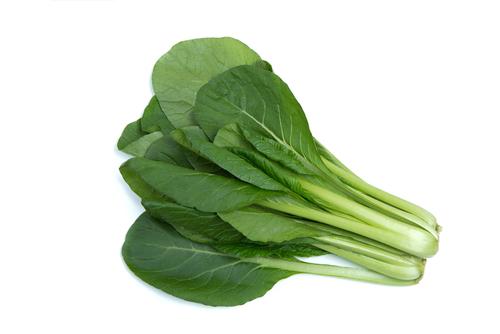
The taste is also somewhat different from regular spinach; the bitterness in the Japanese mustard spinach is lesser and it is also quite mild. This type of spinach can be eaten raw or as a part of salads. You can also boil it and serve it in soups and stews. I also like consuming komatsuna in another way and that is by pickling it.
Health benefits of Komatsuna:
- Boosts the immune system: Komatsuna is a good source of vitamin C, which is an important antioxidant that helps to protect the body from damage caused by free radicals. Free radicals can contribute to the development of chronic diseases such as cancer and heart disease.
- Protects against cancer: Komatsuna contains sulforaphane, an antioxidant that has been shown to have anti-cancer properties. Sulforaphane can help to prevent cancer by killing cancer cells and by stimulating the production of enzymes that help to detoxify the body.
- Improves bone health: Komatsuna is a good source of calcium, which is essential for strong bones. Calcium helps to build and maintain bone density, which can help to prevent osteoporosis.
- Lowers blood pressure: Komatsuna is a good source of potassium, which is a mineral that helps to regulate blood pressure. Potassium helps to balance the effects of sodium in the body, which can help to lower blood pressure.
- Promotes eye health: Komatsuna is a good source of lutein and zeaxanthin, two antioxidants that are important for eye health. Lutein and zeaxanthin can help to protect the eyes from damage caused by ultraviolet light, which can contribute to the development of age-related macular degeneration.
Mizuna
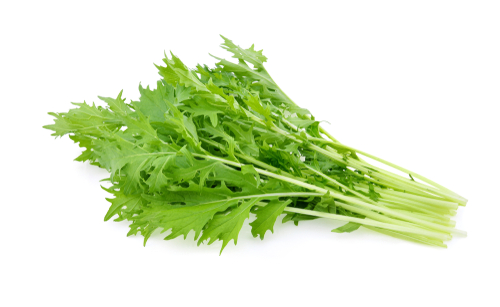
Mizuna is a very popular leaf used in salads and it is known as Japanese mustard or spider mustard. The best combination that you can have with mizuna is the giant white radish that is extremely popular in Japan. Mixing these to give you a very fresh salad that is full of flavors. Mizuna can also be added to soups and hotpots. It can also be used as a garnish.
Health benefits of Mizuna:
- Rich source of antioxidants: Mizuna is an excellent source of antioxidants, including vitamin C, beta carotene, lutein, kaempferol, and quercetin. Antioxidants help protect cells from damage caused by free radicals, which can lead to chronic diseases such as cancer, heart disease, and Alzheimer’s disease.
- Protects heart health: Mizuna is a good source of potassium, which helps regulate blood pressure and heart function. It is also a good source of folate, which is important for preventing birth defects.
- High in vitamin K: Vitamin K is an essential micronutrient that supports blood clotting and bone health. Mizuna is a good source of vitamin K, which can help prevent osteoporosis and fractures.
- Good for gut health: Mizuna is a good source of fiber, which helps promote regular bowel movements and prevents constipation. Fiber also helps feed the beneficial bacteria in the gut, which can improve overall health.
- Promotes eye health: Mizuna is a good source of beta-carotene, which is converted to vitamin A in the body. Vitamin A is important for vision, especially night vision.
- May help fight cancer: Mizuna contains glucosinolates, which are compounds that have been shown to have anticancer effects. Glucosinolates can help protect cells from damage and prevent the growth of cancer cells.
Overall, mizuna is a healthy and nutritious vegetable that can provide a number of health benefits. It is a good source of vitamins, minerals, and antioxidants, and it can help protect against chronic diseases.
Daikon
Daikon or the giant white radish is one of the most popular and the most bought vegetables in Japan. It is extremely versatile and can be eaten both raw and cooked. You can also grate the daikon and use it as a refreshing topping especially in oily dishes.
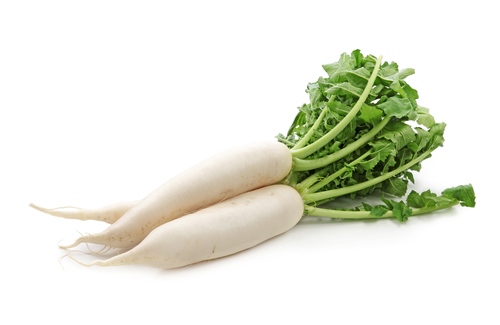
Doing this balances the oiliness in food items like grilled fish and tempura. The best part that I love about this daikon is the spicy bottom half.
However, if you are not a fan of spiciness, you can always cook it because that reduces the level of spiciness. In fact, cooking it makes it slightly on the sweeter side. You can also cut the daikon and use it raw in salads.
You can also pair it with Mizuna leaves to get a very refreshing and delicious taste. When cooking, you can boil the daikon in soups, stews, or hotpots.
If you visit any Japanese restaurant and order an Oden hotpot, you will notice that daikon is the most popular ingredient. It is also Japan’s favorite pickle. The pickled Daikon is known as takuan in Japanese.
Health benefits of Daikon:
- Boosts immunity: Daikon is a good source of vitamin C, which is an antioxidant that helps to boost the immune system. Vitamin C is also necessary for the production of white blood cells, which help to fight infection.
- Protects against cancer: Daikon contains compounds that have been shown to have anti-cancer properties. For example, daikon contains glucosinolates, which are converted into isothiocyanates in the body. Isothiocyanates have been shown to inhibit the growth of cancer cells.
- Aids digestion: Daikon contains digestive enzymes that help to break down food. It also contains fiber, which helps to keep the digestive system healthy.
- Lowers blood pressure: Daikon is a good source of potassium, which is a mineral that helps to lower blood pressure.
- Improves heart health: Daikon contains compounds that help to protect the heart. For example, daikon contains anthocyanins, which are antioxidants that have been shown to reduce the risk of heart disease.
- Detoxifies the body: Daikon is a good source of water, which helps to flush toxins out of the body. It also contains fiber, which helps to bind to toxins and remove them from the body.
Jagaimo
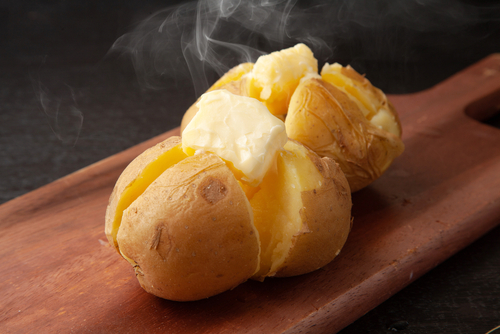
Jagaimo or potato only became a part of the traditional Japanese cuisine recently. Potatoes are not native to Japan. It was brought into the country by Dutch traders from Indonesia.
Potato cultivation in Japan only began at the end of the 19th century. Today, the region of Hokkaido is known to be one of the biggest producers of Jagaimo. There are several popular Japanese dishes that feature Jagaimo.
One of the most common and popular dishes is nikujaga or meat and potato stew. This is a dish that combines beef vegetables and potatoes and it uses sweet soya sauce to add that flavor to it.
Health Benefits of Jagaimo:
- High in antioxidants: Jagaimo is a good source of antioxidants, which can help protect the body against damage from free radicals. Free radicals are unstable molecules that can damage cells, leading to a number of health problems, including cancer, heart disease, and aging.
- Good source of dietary fiber: Jagaimo is a good source of dietary fiber, which can help regulate digestion and promote gut health. Fiber can also help lower cholesterol levels and reduce the risk of heart disease.
- May help improve blood sugar control: Jagaimo is a low-glycemic food, which means that it does not cause a sudden spike in blood sugar levels. This makes it a good choice for people with diabetes or those who are trying to manage their blood sugar levels.
- May help boost the immune system: Jagaimo is a good source of vitamin C, which is an important nutrient for the immune system. Vitamin C helps the body fight off infection and repair damaged cells.
- May help protect against cancer: Jagaimo contains compounds that may have anti-cancer properties. For example, one study found that eating sweet potatoes may help reduce the risk of developing lung cancer.
Overall, jagaimo is a healthy and nutritious food that can offer a number of health benefits. It is a good source of antioxidants, dietary fiber, and vitamin C. It may also help improve blood sugar control, boost the immune system, and protect against cancer.
Satsumaimo
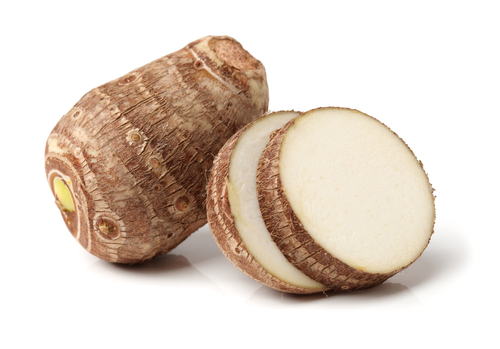
Satsumaimo is a very popular winter vegetable in Japan. This vegetable is used to make both sweet as well as Savory dishes. In Japan, people love eating this vegetable as a snack by simply grilling and peeling it.
This snack is commonly known as Yakimo. We can also use a batter and deep fry Satsumaimo. Another popular way of eating this vegetable is by adding it to soups and stews or Japanese curry.
Health benefits of Satsomaimo
- Antioxidant protection: Satsumaimo is a good source of antioxidants, which can help protect your cells from damage caused by free radicals. Free radicals are unstable molecules that can contribute to the development of chronic diseases such as heart disease, cancer, and Alzheimer’s disease.
- Improved vision: Satsumaimo is a good source of beta-carotene, which is converted to vitamin A in the body. Vitamin A is essential for good vision, and it can help protect your eyes from night blindness and other eye problems.
- Heart health: Satsumaimo is a good source of potassium, which is an important mineral for heart health. Potassium helps to regulate blood pressure and heart rhythm.
- Weight loss: Satsumaimo is a low-calorie food that is high in fiber. Fiber can help you feel full and satisfied, which can make it easier to lose weight or maintain a healthy weight.
- Improved digestion: Satsumaimo is a good source of fiber, which is essential for good digestion. Fiber helps to keep your digestive system healthy by adding bulk to your stool and helping it to pass through your system more easily.
- Skin health: Satsumaimo is a good source of vitamin C, which is essential for healthy skin. Vitamin C helps to protect your skin from damage caused by the sun and pollution.
Overall, satsumaimo is a nutritious vegetable that has a number of health benefits. It is a good source of vitamins, minerals, and antioxidants, and it can help to improve your vision, heart health, weight loss, digestion, and skin health.
Satoimo
Satoimo or taro root is a very popular vegetable in many parts of Asia. This is most commonly eaten in India, China, Korea, and Japan. It has a very slimy and sticky texture and has a high starch content. Satoimo is always cooked before eating.

This vegetable most commonly makes its appearance in boiled or stewed dishes. Japanese love adding Satoimo in miso soup, hotpot, Japanese curry, and even in deep-fried form.
Health benfits of Satoima:
- Improved digestion: Satoimo is a good source of fiber, which can help to regulate digestion and prevent constipation. The fiber in satoimo also helps to bind toxins and remove them from the body
- Lowered blood pressure: Satoimo is high in potassium, which is a mineral that helps to regulate blood pressure. Potassium can help to counteract the effects of sodium, which can raise blood pressure.
- Reduced risk of heart disease: Satoimo is a good source of fiber and resistant starch, which have been shown to reduce the risk of heart disease. Resistant starch is a type of fiber that is not digested in the small intestine, and it can help to lower cholesterol levels and improve blood sugar control.
- Anti-aging effects: Satoimo is high in hyaluronic acid, which is a substance that is essential for skin health. Hyaluronic acid helps to keep the skin hydrated and plump, and it can also help to reduce the appearance of wrinkles.
- Weight loss: Satoimo is a low-calorie food that is high in fiber, making it a good choice for people who are trying to lose weight. The fiber in satoimo can help you to feel full longer, which can help you to eat less calories overall.
Satoimo is a versatile vegetable that can be enjoyed in a variety of dishes. It can be boiled, steamed, fried, or roasted. It is also a popular ingredient in Japanese desserts and beverages.
Nagaimo
Nagaimo is also known as yam. This is a very versatile vegetable that can be eaten in different ways. You can slice and grill it or you can also eat it raw.
If you want to eat it raw, you can grate it to form a sticky paste that is known as Tororo. You can use this sticky paste as toppings to your rice, soba, or udon noodles. You can also mix it with fish stock for some added flavor.
Health benefits of Nagaimo:
- Improved digestion: Nagaimo contains the enzyme amylase, which helps break down carbohydrates. This can help improve digestion and prevent constipation.
- Reduced blood sugar levels: Nagaimo contains fiber, which can help slow down the absorption of sugar into the bloodstream. This can help reduce blood sugar levels in people with diabetes or prediabetes.
- Regulated blood pressure: Nagaimo is a good source of potassium, which helps regulate blood pressure. Potassium helps to balance the effects of sodium in the body, which can help lower blood pressure.
- Increased energy levels: Nagaimo is a good source of carbohydrates, which can provide the body with energy. It is also a good source of vitamin B6, which is essential for energy metabolism.
- Improved skin health: Nagaimo contains mucin, a protein that has anti-inflammatory and wound-healing properties. This can help improve skin health by reducing inflammation and promoting wound healing.
- Reduced inflammation: Nagaimo contains antioxidants, which can help reduce inflammation in the body. Inflammation is linked to a number of chronic diseases, so reducing inflammation can have a number of health benefits.
- Wound healing: Nagaimo contains mucin, a protein that has wound-healing properties. This can help promote wound healing and reduce the risk of infection.
Renkon
Renkon or Lotus root is very common in Japan. What is extremely attractive about the Lotus root is its pattern. You can use lotus root to make your dishes look visually very appealing.
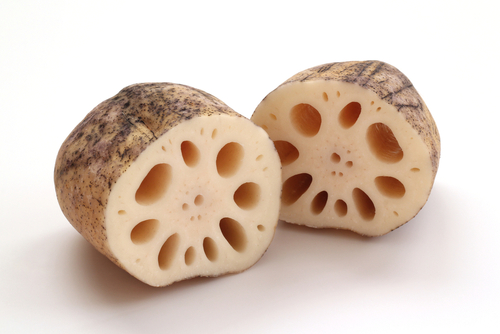
You cannot normally eat it raw but you can peel and boil it in water. The amount that you boil it decides its texture. It can be very crunchy or quite soft. Renkon is often used in tempura, boiled in soups, or used in stewed dishes.
You can also make a salad and dress it with vinegar. The best way to cut Renkon is by slicing it because that is how you can see its attractive pattern.
Health benefits of Renkon:
- Reduces cholesterol: Renkon contains soluble fiber, which helps to bind to cholesterol and remove it from the body. This can help to lower LDL (bad) cholesterol levels and reduce the risk of heart disease.
- Improves digestion: Renkon is a good source of dietary fiber, which is essential for digestive health. Fiber helps to keep the digestive system running smoothly and can help to prevent constipation.
- Lowers blood pressure: Renkon is a good source of potassium, which is a mineral that helps to regulate blood pressure. Potassium helps to counteract the effects of sodium, which can raise blood pressure.
- Boosts immunity: Renkon is a good source of vitamin C, which is an antioxidant that helps to boost the immune system. Vitamin C helps to protect the body from harmful free radicals and can help to fight off infection.
- Helps with weight loss: Renkon is a low-calorie vegetable that is high in fiber. This makes it a good choice for people who are trying to lose weight or maintain a healthy weight.
Gobo
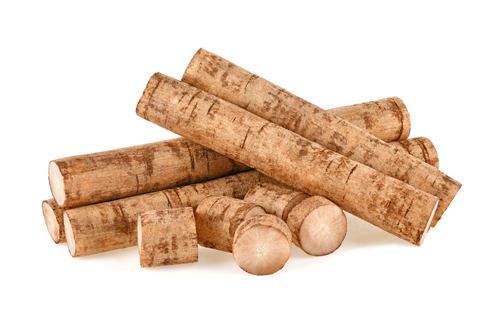
Gobo, which is known as Burdock root, is commonly consumed in Japan. The plant however exists all over the world. Burdock root is cut into pieces before it is sold so that it is more manageable. It is always cooked before eating and the most common way of consuming burdock root is by using it as toppings for soups.
Health benefits of Gobo:
- Antioxidant. Gobo is a good source of antioxidants, which can help protect cells from damage caused by free radicals. Free radicals are unstable molecules that can contribute to the development of chronic diseases such as cancer and heart disease.
- Diuretic. Gobo is a diuretic, which means it can help increase urine production. This can be helpful for people who are trying to reduce bloating or water retention.
- Digestive aid. Gobo is a good source of fiber, which can help keep the digestive system healthy. Fiber can help to regulate bowel movements and prevent constipation.
- Immune system booster. Gobo contains compounds that may help boost the immune system. This could help protect against infection and disease.
- Anti-inflammatory. Gobo has anti-inflammatory properties, which can help reduce inflammation throughout the body. Inflammation is linked to a number of chronic diseases, so reducing inflammation can be beneficial for overall health.
Shoga
Shoga, or ginger, is something that many will not consider as a vegetable. In Japan, it is used as a very versatile vegetable. Shoga is more of a spice than a vegetable and is a winter delicacy.
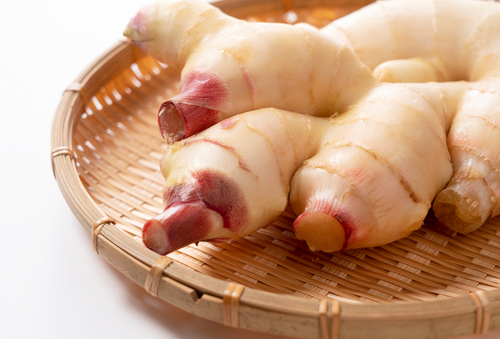
Shoga is used to add some heat to winter meals. It is also used in making fish dishes so that the fishy smell can be reduced. Also, for certain types of sushi and sashimi, ginger is grated and used alongside wasabi as a spice.
Shoga is also ground and used as Tofu toppings. Ginger is also pickled and eaten as a delicacy in Japan.
Health benefits of Shoga:
- Nausea relief: Shoga is a traditional remedy for nausea, and it is often used to treat morning sickness, motion sickness, and nausea caused by chemotherapy.
- Digestive health: Shoga can help to improve digestion and relieve indigestion, gas, and bloating. It can also help to prevent constipation.
- Anti-inflammatory properties: Shoga contains compounds that have anti-inflammatory properties. This can help to reduce inflammation in the body, which can be beneficial for conditions such as arthritis, muscle pain, and headaches.
- Immunity boost: Shoga contains antioxidants that can help to boost the immune system. This can help to protect the body against infection.
- Heart health: Shoga can help to lower blood pressure and cholesterol levels. This can help to reduce the risk of heart disease and stroke.
Takenoko
Takenoko is a bamboo shoot and it is the soft part of a young bamboo plant. It is one of the most delicious vegetables that you will find in Japan and in several other parts of Asia.
The harvesting time of Takinoko is extremely important; if the plant is allowed to grow, it can become hard and green.
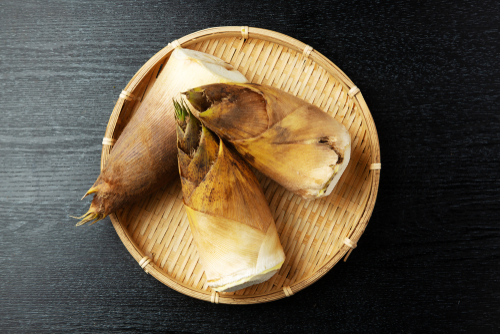
So, the best time to harvest this vegetable is just before the plant comes out of the soil. There are different ways of consuming Takenoko; you can steam, grill, deep-fried, or boil Takenoko in soups and stews.
Health benefits of Takenoko:
- Promotes digestive health: Takenoko is a good source of fiber, which can help to keep your digestive system healthy. Fiber helps to keep your bowel movements regular and can also help to reduce the risk of constipation and colon cancer.
- Lowers blood pressure: Takenoko is a good source of potassium, which is a mineral that helps to regulate blood pressure. Potassium helps to balance the effects of sodium in the body, which can help to lower blood pressure.
- Boosts the immune system: Takenoko is a good source of vitamin C, which is an antioxidant that helps to boost the immune system. Vitamin C helps to protect the body from damage caused by free radicals, which can contribute to the development of chronic diseases.
- May help to prevent cancer: Takenoko contains compounds that may have anti-cancer properties. For example, bamboo shoots contain a compound called silymarin, which has been shown to inhibit the growth of cancer cells in laboratory studies.
Negi
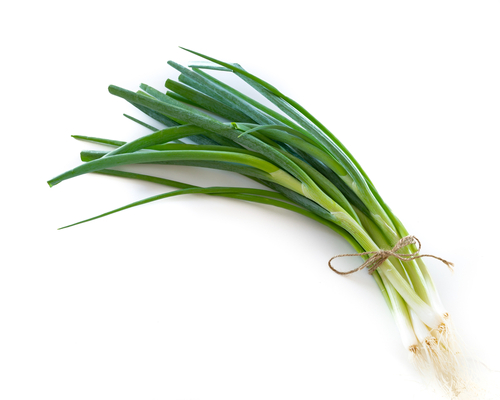
Negi or leak or green onion is another popular vegetable in Japan that is used in several fried and boiled dishes; this vegetable is also used as toppings for many kinds of dishes.
While Negi is considered to be just like the green onion, it has a slightly sweet taste. There are different varieties of Negi available in different regions of Japan.
The most common ones are the Kanto variety and the Kansai variety.
Health benefits of Negi:
- Boosts the immune system. Negi is a good source of vitamin C, which is an important antioxidant that helps to protect the body against damage from free radicals. Free radicals are unstable molecules that can damage cells and contribute to the development of chronic diseases.
- Lowers the risk of cancer. Negi contains sulfur compounds, which have been shown to have anti-cancer properties. These compounds can help to protect cells from damage and prevent the growth of cancer cells.
- Supports heart health. Negi is a good source of potassium, which is an important mineral for heart health. Potassium helps to regulate blood pressure and heart rate.
- Promotes weight loss. Negi is a low-calorie food that is high in fiber. Fiber can help to promote feelings of fullness and make it easier to lose weight.
- Improves digestion. Negi contains soluble fiber, which can help to keep the digestive system healthy. Soluble fiber can help to bind to toxins and waste products in the gut, and help to remove them from the body.
- Boosts energy levels. Negi is a good source of vitamin B6, which is an important vitamin for energy production. Vitamin B6 helps the body to convert food into energy.
Tomato
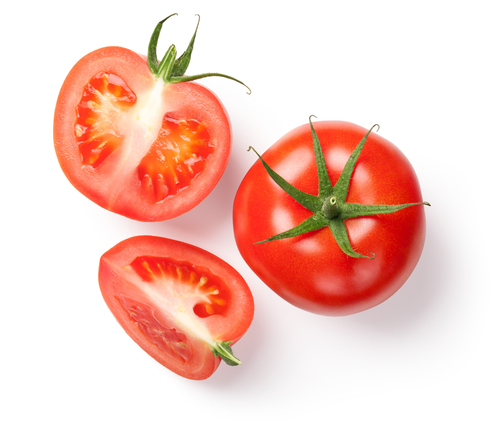
Who does not know about tomatoes? In Japan, tomatoes are part of the Western dishes of the country. These are eaten raw in salads or are also used as a garnish.
While it is extremely popular, you will rarely find it in most Japanese dishes. The one Japanese dish where you will find tomatoes is in the Japanese bento boxes, but even here you will find the cherry tomatoes because of their size and color.
Health benefits of Tomato:
- Reduced risk of heart disease. Tomatoes are a good source of lycopene, an antioxidant that has been shown to lower LDL (bad) cholesterol and reduce the risk of heart disease.
- Reduced risk of cancer. Lycopene is also thought to protect against certain types of cancer, including prostate cancer, lung cancer, and stomach cancer.
- Improved eye health. Tomatoes contain vitamin C, which is essential for eye health. They also contain lycopene, which may help protect against age-related macular degeneration (AMD).
- Boosted immunity. Tomatoes are a good source of vitamin C, which is an important nutrient for the immune system.
- Improved skin health. Lycopene is thought to protect the skin from damage caused by the sun’s ultraviolet rays. Tomatoes also contain vitamin C, which is essential for collagen production.
- Weight loss. Tomatoes are low in calories and high in fiber, making them a good food choice for people who are trying to lose weight.
Kyuri
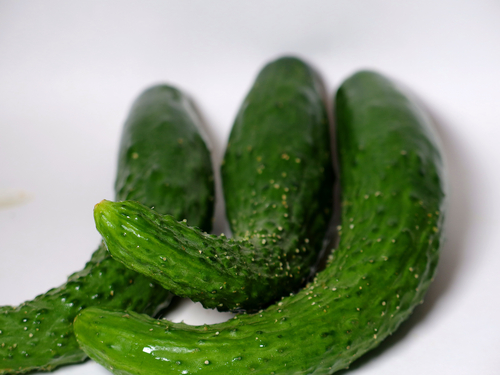
Kyuri is one of the most popular Japanese summer vegetables. The Japanese cucumbers Kyuri are thinner than the cucumbers we find in the west. These cucumbers are also eaten without peeling them. Kyuri is often eaten raw in salads. The Japanese also love their Kyuri in its pickled form.
Health benefits of Kyuri:
- Hydration: Kyuri is about 95% water, so it is a great way to stay hydrated. This is especially important during hot weather or when you are exercising.
- Weight loss: Kyuri is low in calories and fat, and it is a good source of fiber. This makes it a good food to eat if you are trying to lose weight or maintain a healthy weight.
- Heart health: Kyuri contains potassium, which is a mineral that helps to regulate blood pressure. It also contains antioxidants, which can help to protect the heart from damage.
- Eye health: Kyuri is a good source of vitamin C, which is an antioxidant that helps to protect the eyes from damage. It also contains beta-carotene, which is converted to vitamin A in the body. Vitamin A is important for vision, especially night vision.
- Skin health: Kyuri contains antioxidants that can help to protect the skin from damage caused by the sun and pollution. It also contains silica, which is a mineral that helps to keep the skin looking young and healthy.
- Digestion: Kyuri contains fiber, which is important for digestion. Fiber helps to keep the digestive system healthy and can help to prevent constipation.
- Cancer prevention: Kyuri contains antioxidants that can help to protect the body from cancer. It also contains lignans, which are plant compounds that have been shown to have anti-cancer properties.
Nasu
The Japanese Nasu or egg plant, also known as aubergine, is different from the North American and European eggplants. Nasu is one of the most important and popular vegetables in Japanese cuisine.
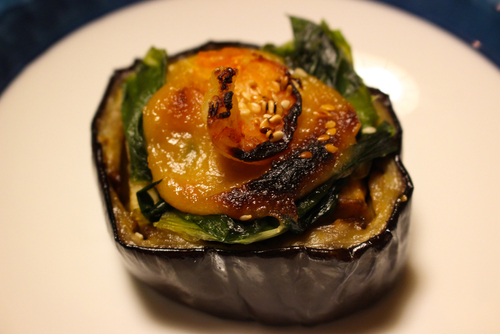
You will see Nasu in a wide variety of Japanese dishes. One of the most typical dishes that you will find in Japan containing Nasu is known as Nasu dengaku. In this dish, Nasu is cut in half and then baked with a layer of miso paste.
Nasu is not just a vegetable in Japan; it is also a very important part of Japanese folklore. It is considered to be good luck if you dream of Nasu in the new year. Also, parents are warned against giving Nasu to their daughter-in-law in the fall.
It is believed that Nasu can deter a pregnancy and so it is not a very good gift to give to your daughter-in-law.
Health benefits of Nasu:
- Reduces the risk of heart disease. Nasu is a good source of fiber, potassium, and magnesium, all of which are important for heart health. Fiber helps to lower cholesterol levels, potassium helps to regulate blood pressure, and magnesium helps to keep the heart rhythm regular.
- Protects against cancer. Nasu contains antioxidants that can help to protect cells from damage. This damage can lead to the development of cancer. Nasu is also a good source of nasunin, an antioxidant that has been shown to specifically protect against prostate cancer.
- Improves blood sugar control. Nasu is a low-glycemic food, which means that it does not cause a sharp spike in blood sugar levels. This makes it a good choice for people with diabetes or those who are trying to lose weight.
- Promotes gut health. Nasu is a good source of fiber, which is essential for gut health. Fiber helps to keep the digestive system healthy and can help to prevent constipation.
- Boosts immunity. Nasu is a good source of vitamin C, an essential nutrient for the immune system. Vitamin C helps to protect the body against infection and can help to shorten the duration of colds and flu.
Piman
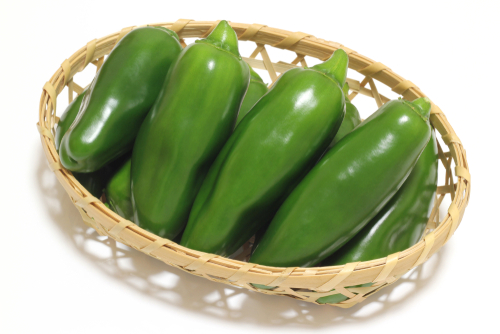
I love Piman or green pepper. As compared to the usual green pepper, Japanese Piman is usually smaller. They have thin skin and the taste is also quite sweet. I love deep-fried green pepper. The Japanese also love the Piman in its stir-fried form in Chinese-influenced dishes.
Health benefits of Piman:
- Boosting the immune system: Vitamin C is an antioxidant that helps to protect the body against damage from free radicals. Free radicals are unstable molecules that can damage cells and lead to inflammation. Vitamin C also helps the body to produce white blood cells, which are essential for fighting infection.
- Protecting against cancer: Piman contains capsaicin, a compound that has been shown to have anti-cancer properties. Capsaicin can help to prevent the growth of cancer cells and may even kill some cancer cells.
- Lowering blood pressure: Piman is a good source of potassium, a mineral that helps to regulate blood pressure. Potassium helps to balance the effects of sodium in the body, which can lead to high blood pressure.
- Improving heart health: Piman contains antioxidants that can help to protect the heart against damage from free radicals. Free radicals can damage the lining of the arteries, which can lead to heart disease.
- Promoting weight loss: Piman is a low-calorie food that is high in fiber. Fiber helps to keep you feeling full, which can help you to eat less and lose weight.
Shishito
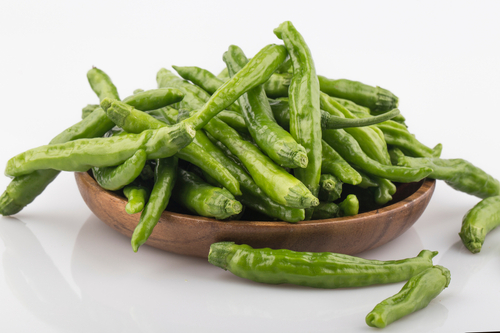
Shishito is a smaller variety of Japanese green pepper. They have a sweet and mild peppery taste, however, there are certain varieties that are quite spicy. You will most often find shishito deep-fried or roasted and topped with soya sauce. Bonito flakes are also used as a topping.
Health benefits of Shishito:
- Boost immune system: Shishito peppers are a good source of vitamin C, which is an important nutrient for the immune system. Vitamin C helps the body fight off infection and disease.
- Protect against heart disease: Shishito peppers contain antioxidants, which can help protect against heart disease. Antioxidants help to neutralize free radicals, which can damage cells and contribute to the development of heart disease.
- Lower cholesterol: Shishito peppers are a good source of fiber, which can help to lower cholesterol levels. Fiber helps to bind to cholesterol in the digestive tract and prevents it from being absorbed into the bloodstream.
- Improve eye health: Shishito peppers are a good source of vitamin A, which is important for eye health. Vitamin A helps to protect the eyes from damage and can help to prevent vision problems such as night blindness.
- Promote skin health: Shishito peppers are a good source of vitamin C, which is important for skin health. Vitamin C helps to keep the skin looking young and healthy by producing collagen, which is a protein that gives the skin its structure.
Kabocha
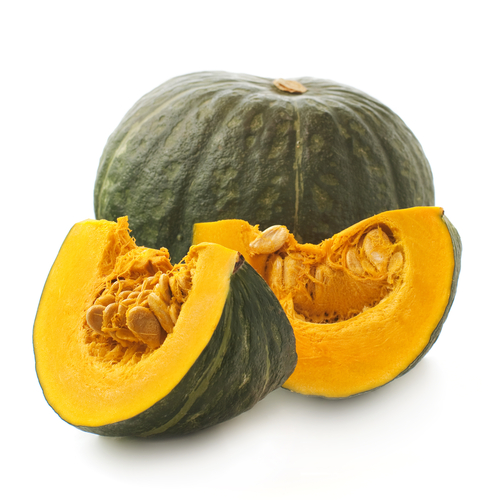
Kabocha or pumpkin is one of the most important Japanese vegetables during the cold winter months.
It is rich in vitamin A and is traditionally eaten to celebrate the Winter solstice or the shortest day of the year.
There are several ways of consuming kabocha and the most common one is as deep-fried tempura or boiled in sugar and soy sauce.
Health benefits of Kabocha:
- Improves eye health: Kabocha squash is a good source of beta-carotene, which is converted to vitamin A in the body. Vitamin A is essential for eye health, and can help to prevent night blindness and other eye problems.
- Boosts the immune system: Kabocha squash is a good source of vitamin C, which is an important nutrient for the immune system. Vitamin C helps the body fight off infection and disease.
- Protects against cancer: Kabocha squash contains antioxidants, which can help protect against cancer. Antioxidants help to neutralize free radicals, which can damage cells and contribute to the development of cancer.
- Lowers blood pressure: Kabocha squash is a good source of potassium, which can help to lower blood pressure. Potassium helps to balance the effects of sodium in the body, and can help to keep blood pressure in a healthy range.
- Promotes heart health: Kabocha squash is a good source of fiber, which can help to promote heart health. Fiber helps to lower cholesterol levels and reduce the risk of heart disease.
- Aids in digestion: Kabocha squash is a good source of fiber, which can help to aid in digestion. Fiber helps to keep the digestive system healthy and can help to prevent constipation.
- Supports weight loss: Kabocha squash is a low-calorie food that is high in fiber. This makes it a good choice for people who are trying to lose weight or maintain a healthy weight.
Okura
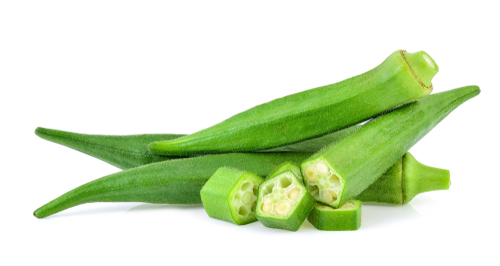
Okura is popular Japanese summer vegetable. Okura or the Western okra is a very versatile dish that can be consumed in different ways.
It can be boiled or fried, eaten raw in salads, or served with soy sauce. The seeds of this vegetable have a sticky layer surrounding them.
This helps to produce a consistency that is similar to that which is derived from yam.
Health benefits of Okura:
- Supporting heart health. Okra is a good source of soluble fiber, which can help to lower cholesterol levels and reduce the risk of heart disease. It is also a good source of potassium, which is a mineral that helps to regulate blood pressure.
- Protecting against cancer. Okra contains antioxidants that can help to protect cells from damage, which may help to reduce the risk of cancer.
- Promoting gut health. Okra is a good source of fiber, which can help to keep the digestive system healthy. The fiber in okra can also help to bind to toxins and remove them from the body.
- Boosting the immune system. Okra is a good source of vitamin C, which is an important nutrient for the immune system. Vitamin C helps the body to produce white blood cells, which fight off infection.
- Aiding in weight loss. Okra is low in calories and fat, and it is a good source of fiber. This makes it a good food choice for people who are trying to lose weight or maintain a healthy weight.
What is the most popular Japanese vegetable?
As per the survey conducted by the Ministry of Health, Labour and Welfare, the most popular Japanese vegetable is daikon or Japanese radish. The second is onions while the cabbage ranked third.
Daikon is usually a part of almost every Japanese need. There are several ways in which daikon may be served. One of the most popular ways of consuming daikon is in its raw form. This way you can fully enjoy the tangy and sharp taste of this vegetable. There is also a slight spiciness to it that appeals to the mass.
The Japanese also love to use grated daikon as a topping; this adds a very refreshing touch to food. Apart from these ways, there are several different ways in which daikon is used in Japanese meals.
Are you ready to enjoy a delicious and balanced diet with these vegetables?
Also read


